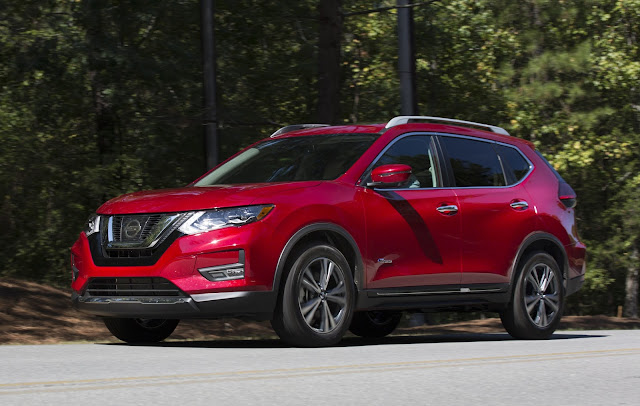 |
| The 2017 Nissan Rogue Hybrid. |
As we noted at the end of that review, it's the value equation that makes the Rogue a contender, and this year, Nissan has brought a Rogue Hybrid to market that keeps the value strong.
 |
| 2017 Nissan Rogue Hybrid. |
Nissan has avoided this trap. Our test vehicle was the base-level SV (the photos accompanying this review are of the uplevel SV---Ed.), with a base price, in all-wheel-drive form, of $27,590. That is only $1,000 more than a gasoline-powered Rogue SV AWD. For that $1,000, fuel economy improves from 25 miles per gallon in the city and 32 on the highway to 31 in the city and 34 on the highway. A small bonus---the combination of the gasoline and electric powerplant results in five horsepower more than the gasoline model.
 |
| 2017 Nissan Rogue Hybrid interior (SL model shown). |
- 17-inch alloy wheels
- Four-wheel disc brakes
- Hill start assist
- Vehicle dynamic control
- Traction control
- Electronic brake force distribution
- Brake assist
- Security system with immobilizer
- Tire pressure monitoring
- Blind spot warning
- Rear cross-traffic alert
- Six-way power driver seat with power lumbar support
- 60/40 split-folding second-row seat
- Heated front cloth seats
- Leather-wrapped steering wheel and shift knob
- Six-speaker audio system
- Five-inch color audio display
- SiriusXM Satellite Radio
- USB
- Bluetooth
- Hands-free text messaging assistant
- Three 12-volt power outlets
- Rear view camera and monitor
- Dual-zone automatic climate control
- Second row A/C vents
- Illuminated visor vanity mirrors
- Under-floor cargo storage
- Power door locks
- Intelligent key with pushbutton start and remote engine start
- LED daytime running lights
- Halogen headlamps
- Heated outside mirrors with LED turn signals
- Privacy glass
- Roof rails
- Chrome outside door handles.
Again, that is all standard equipment for the $27,590 base price. And that is very impressive.
Our test vehicle had the optional SV HEV Premium Package, which adds navigation, upgrades the five-inch audio system screen to a seven-inch touchscreen, includes SiriusXM Traffic, SiriusXM Travel Link and Siri Eyes Free, upgrades the audio system itself to a nine-speaker Bose unit, and adds an around-view monitor, moving object detection, upgrades the leather-wrapped steering wheel to one that is heated and tops it off with a motion-activated liftgate and a power panoramic moonroof. The cost is $2,870. With $225 for floor mats and cargo area protector and $940 destination charges, the as-tested price came to $31,625.
For the level of equipment involved and the hybrid powertrain, that is tremendous value, and should put Nissan in a strong position against the RAV4 Hybrid and the inevitable competitors who will jump into this segment in the next few years.